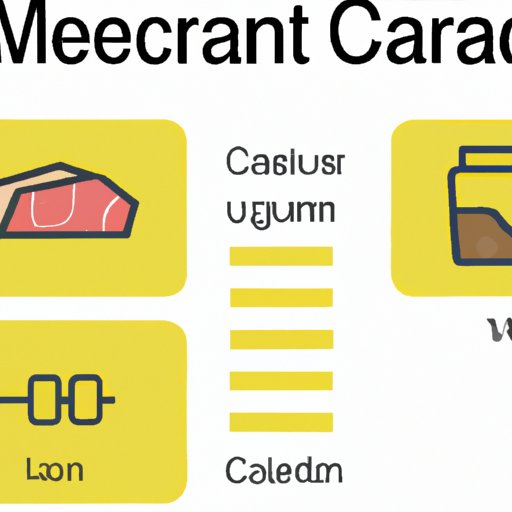Introduction
Gaining lean muscle is an increasingly popular fitness goal amongst individuals of all ages. To achieve this goal, it’s important to understand what it means to “gain lean muscle” and how macronutrients and calorie intake play a role in achieving this goal.
Definition of Lean Muscle Gain
Lean muscle gain refers to increasing muscle mass while reducing fat. It is often associated with bodybuilding and other physical activities that require strength and muscle definition. The goal is to increase lean muscle mass while maintaining a low body fat percentage.
Overview of Macronutrients
Macronutrients are the nutrients our bodies need in large amounts. They are essential for providing energy and building muscle. The three main macronutrients are protein, carbohydrates, and fats. Each plays an important role in muscle building, and understanding their function can help you achieve your fitness goals.

Exploring Macronutrients for Lean Muscle Gain
Protein
Protein is the most important macronutrient for gaining lean muscle. According to a study published in the journal Sports Medicine, “Protein is the primary nutrient responsible for stimulating muscle protein synthesis and the growth of new muscle cells.” Protein helps build and repair muscle, making it an essential part of any muscle-building program.
Carbohydrates
Carbohydrates are the body’s main source of energy. They provide fuel for exercise and help restore glycogen levels after a workout. A study published in the American Journal of Clinical Nutrition found that “carbohydrate ingestion during or immediately following resistance exercise enhances muscle recovery and adaptation.” This means that consuming carbohydrate-rich foods before and after a workout can help maximize gains in lean muscle mass.
Fats
Fats are also important for muscle building. A study published in the International Journal of Sport Nutrition and Exercise Metabolism found that “a moderate-fat diet (20-30% of total energy intake) may be advantageous for promoting gains in lean body mass.” Fats are also important for helping the body absorb vitamins and minerals, which can help optimize muscle growth.

Calculating Calorie Intake for Lean Muscle Gain
Establish a Calorie Goal
Before you can calculate how many calories you need to consume for lean muscle gain, it’s important to establish a calorie goal. This will depend on your current weight and activity level. If you’re looking to gain muscle, you should aim to consume more calories than you burn. This will give your body the energy it needs to build muscle.
Use an Online Calculator to Calculate Calories Needed
Once you have established a calorie goal, you can use an online calculator to determine how many calories you need to consume to reach that goal. These calculators take into account factors like your age, gender, height, weight, and activity level to determine how many calories you should eat to gain lean muscle.
A Guide to Protein Intake for Lean Muscle Mass
Definition of Protein
Protein is an essential macronutrient for building muscle. It helps build and repair muscle tissue, and it’s necessary for muscle growth.
Recommended Daily Intake
To gain lean muscle, it’s recommended that you consume 1-1.5 grams of protein per pound of body weight. For example, if you weigh 150 pounds, you should consume between 150-225 grams of protein per day.
Sources of Protein
Protein can be found in a variety of sources, including lean meats, fish, eggs, dairy products, nuts, and beans. It’s important to consume a variety of sources to ensure you’re getting all the essential amino acids your body needs.
How to Balance Carbs and Fats for Lean Muscle Building
Benefits of Carbohydrates
Carbohydrates are an important source of energy for muscle building. They provide fuel for workouts and help restore glycogen levels after a workout. Consuming carbs before and after a workout can help maximize gains in lean muscle mass.
Benefits of Fats
Fats are an important part of any muscle-building program. They provide energy, support muscle growth, and help the body absorb vitamins and minerals. Eating a moderate amount of healthy fats can help optimize muscle growth.
Strategies for Balancing Carbs and Fats
For optimal muscle growth, it’s important to balance your intake of carbs and fats. Aim for a ratio of 40% carbs, 30% protein, and 30% fats. This will provide your body with the energy it needs to build muscle and reduce body fat.

Establishing a Calorie Deficit for Lean Muscle Gain
Definition of Calorie Deficit
A calorie deficit occurs when you consume fewer calories than you burn. This can help you lose body fat while still gaining muscle.
Benefits of Calorie Deficit
A calorie deficit can help you achieve the ideal body composition for lean muscle gain. It can help you lose body fat while still allowing you to consume enough calories to build muscle.
Calculating Deficit
To calculate your calorie deficit, subtract 500-1000 calories from your daily calorie goal. This will give you an estimate of how many calories you need to consume to lose body fat while still gaining muscle.
Conclusion
Gaining lean muscle requires a balanced diet of macronutrients and an understanding of how many calories you need to consume. Protein is the most important macronutrient for muscle building, and it’s important to consume enough carbs and fats to provide energy for workouts and muscle growth. Establishing a calorie goal and creating a calorie deficit can help you achieve your fitness goals.
By understanding macronutrients and calorie intake, you can create a diet plan that will help you gain lean muscle mass. With the right nutrition and exercise plan, you can reach your fitness goals and enjoy the benefits of lean muscle gain.
(Note: Is this article not meeting your expectations? Do you have knowledge or insights to share? Unlock new opportunities and expand your reach by joining our authors team. Click Registration to join us and share your expertise with our readers.)
